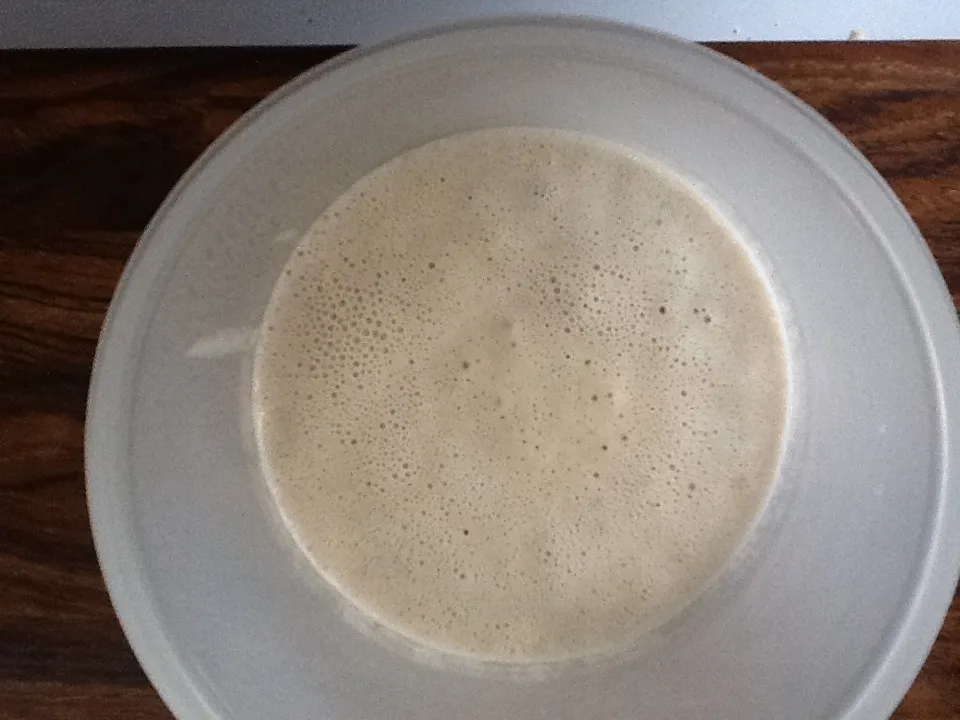
Hi
I wonder if someone could tell me if this is normal or not.
Just after the new year I started making my own starter but in April I was due to go on a course which meant I would be washy from home for a while so I dried some in my oven and froze it. The rest I left in a pot in the fridge and asked hubby to feed it once a week which he apparently did for a few weeks but then he got bored or forgot.
When I got back the refrigerated starter had a grey yukey liquid on the surface, smelt like a brewery and looked pretty bad so I threw it out.
I didn't hold much home for the frozen starter because I had dried it in a slightly warm oven and had no way of telling whether I had killed the yeast or not so the day before yesterday I mixed flour and water with the intention of starting again but just for the fun of it I weighed a packet of the frozen starter and rehydrated it with an equal volume of water.
When I got up this morning the container was full of quite big bubbles so I thought why not and I mixed the two starters together and gave then a feed of 70g flour 70g warm water and after mixing its all in I left them on the side. That was around an hour or so ago and I am shocked to find its more than doubled in size and bubbling like a witches brew see photo.
I would have thought it needed a couple of feeds at least before it started to work again so is this normal or do I have something weird going on?
all the best Gene
the one you threw out was still good too. It is ampost impossible to kill a good starter. I have tried every way known to man but I can't kill it by leaving it untended in the fridge, freezing, drying it or freez drying it :-) Nice save.
Thanks for that, its reassuring.
I looked it again last night and there was hooch building up just a few hours after feeding which is curious; I feed it, it rises and bubbles, reaches a peak, sinks down and starts producing hooch pretty immediately.
The whole thing is extremely vigorous, very ripe, quite sour and pretty odorous so I wonder if 70gs each of flour and water is enough (The flour is Allison's Strong bread flour and the water is from the fridge with a dash of hot water to bring it up to room temperature).
Or maybe the water is too warm. It's just our tap water has lots of chlorine in it so I prefer to use water that has rested in the fridge to give the chlorine a chance to dissipate but then its too cold so I use water from the kettle to take the chill off.
About 15 minutes ago I gave the starter a breakfast of 100g strong bread flour and 100g slightly warm water and a good whisk and this is it now
(the top of the piece of tape marks where it was 15 minutes ago) so it looks happy enough but its still pretty vigorous- in fact I type slowly so its taken me another 15 minutes or so to construct this message and its now a good inch over the tape.
The original starter was my first attempt at sourdough starters so I still don't really know what I am doing but we did like the way it improved the taste of the bread and the pikelets/crumpets and American style pancakes we got from the surplus were good too so I plan to persevere.
Out of curiosity when will it be good to use, do I need to feed it for a week and wait for it to smell less like sour or is all this vigorousness a sign that its ready to use now and when can I put it in the fridge and return to 3 - 5 day feeds as I don't want to end up with too much of the stuff.
Many thanks for your help - most appreciated
Gene
fast it is too thin and you are starving it. Get it to 100% hydration by using the same weight, not volume, of flour and water. A cup of flour weighs 140 g and a 1/2 cup of water weighs 120 g. So a cup of flour and 1/2 cup of water and 1 T of starter will work. Once it doubles it is ready to use. THinnstarters go through food very fast. If you thicken it up some it will be much better adn easier to maintain
Mike Avery says he uses plain tap water for his starters. Without experimentation, I prefer to use water that has been passed through a carbon filter to get rid of most of the chlorine. Boiling the water will remove most of the chlorine. Cool the boiled water to 85°F before using it with your starter.
Ford